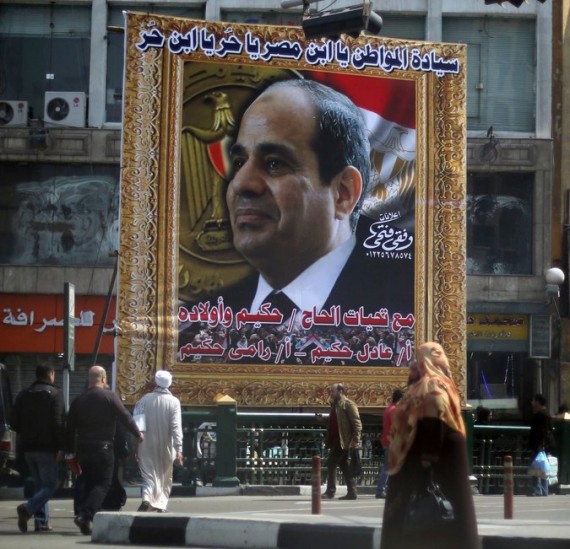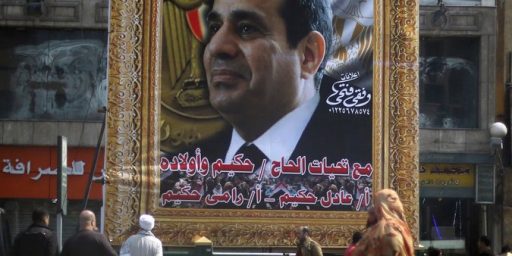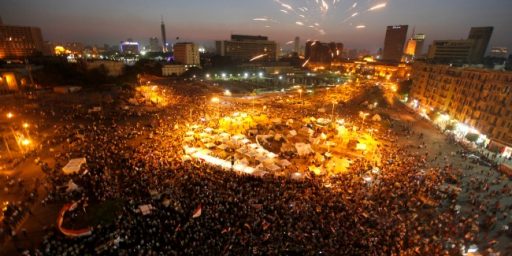New Dictator Wins Egyptian Presidential Election
Different name, same result in Egypt.
Abdel Fattah el-Sisi, the former General who led the military coup that deposed President Mohammed Morsi last July, has won election as the next President of Egypt in an election that doesn’t seem to have met any of the standards for international legitimacy:
Former military chief Abdul Fattah al-Sisi has won an overwhelming victory in Egypt’s presidential election, according to provisional results.
He gained more than 93% of the vote with ballots from most polling stations counted, state media say.
Turnout is expected to be about 46% – far lower than Mr Sisi was hoping for as an endorsement. Islamist and some secular groups boycotted the vote.
Mr Sisi’s only opponent Hamdeen Sabahi has admitted defeat.
“I accept my defeat and respect the people’s choice,” Mr Sabahi said in a televised press conference.
However, he also said there were “violations” in the voting process, and rejected the 46% turnout announced by the government, describing it as an “insult to the intelligence of Egyptians”.
Mr Sisi deposed President Mohammed Morsi last July after mass protests.
He has overseen a bloody crackdown on Mr Morsi’s Muslim Brotherhood movement in which more than 1,400 people have been killed and 16,000 detained.
The outcome of the vote was not much of a surprised. Prior to the election, the government led by el-Sisi and his military allies had cracked down on most opposition and limited the ability of candidates that might have posed a threat in a legitimate election to even enter the race. Additionally, a team of international observers reported yesterday that the election fell far short of international standards:
CAIRO — Egypt’s presidential election fell short of international standards of democracy, two teams of foreign observers said Thursday, a day after the former military officer who led last summer’s military takeover won a landslide victory with more than 95 percent of the vote.
“Egypt’s repressive political environment made a genuinely democratic presidential election impossible,” Eric Bjornlund, president of Democracy International, an election-monitoring organization funded by the United States, said in a statement. In an interview, he called the political context “hugely troubling.”
A team of European Union observers said in a statement that, despite guarantees in Egypt’s Constitution, respect for the essential freedoms of association and expression “falls short of these constitutional principles.” Robert Goebbels, a Luxembourg member of the European Parliament, summarized the voting process as “free but not always very fair,” noting the winner’s overwhelming advantage in both financial resources and news media attention.
A team of European Union observers said in a statement that, despite guarantees in Egypt’s Constitution, respect for the essential freedoms of association and expression “falls short of these constitutional principles.” Robert Goebbels, a Luxembourg member of the European Parliament, summarized the voting process as “free but not always very fair,” noting the winner’s overwhelming advantage in both financial resources and news media attention.
(…)
Both teams of foreign observers faulted the last-minute addition of a third day as a needless irregularity that raised doubts about the credibility of the process and the independence of the election authorities.
Mr. Bjornlund of Democracy International said his observers had seen no impediments to voting on the first two days that might have justified a third day, and the European Union delegation said the third day “caused unnecessary uncertainty in the electoral process.”
Egyptian officials said supervision of the government’s High Presidential Election Commission, composed of senior judges, was politically independent and assured the integrity of the vote. But in previous Egyptian elections the best checks on fraud were parallel counts by independent political groups — principally the Muslim Brotherhood — as well as the close monitoring of representatives of opposing campaigns.
Now, the Brotherhood, which dominated Egyptian elections through its political arm over the previous three years, has been outlawed and repressed. On the night before the added day of voting, the Sabahi campaign withdrew its monitors from the polls, complaining that security forces there were excluding, assaulting and arresting them.
As a result, Mr. Bjornlund said, the turnout or vote count could not be confirmed by the relatively small observer missions.
Quite obviously, anyone who wins an election with 95% of the vote in a nation where the main opposition group has been outlawed and its leadership has been imprisoned, where freedom of speech and the press have been suppressed, and where all but a token opponent have been barred from the ballot, did not when their election legitimacy. el-Sisi’s overwhelming win is about as believable as similar election results we’ve seen from the old Soviet Union, Saddam Hussein’s Iraq, or indeed Egypt itself under Hosni Mubarak. So, basically, this is just Egypt returning to the form it has seen since a military coup deposed the King in the early 1950s. Indeed, I would imagine that there are large segments of the Egyptian population that actually do support el-Sisi because they believe, rightly or wrongly, that he will bring stability and prosperity to a nation that has been lacking in both for the last several years. What will happen if he’s unable to do that is, of course, another question. In the end, though, el-Sisi is really just the public face for a government that is run as a subsidiary of the Egyptian military. If things go badly, the leadership would probably just as quick to toss him aside as they were to toss Mubarak aside when the protests became too much to handle in January and February 2011. In the long run, they’re more concerned about maintaining their own place in Egyptian society than they are about the fate of one man.
Given Egypt’s location and its importance in the Arab world, the events there aren’t ones that the rest of the world can mostly ignore in the manner that we have mostly ignored, say, the military coup in Thailand. For better or worse, the Camp David Accords ended up working because the Egyptian military, having been badly beaten by the Israeli military twice in the course of six years between 1967 and 1973, saw them as being in their interest. The danger of an unstable Egypt to the rest of the Middle East should seem rather apparent and, indeed, one of the chief concerns about Morsi Administration and the Muslim Brotherhood was how much they actually supported Camp David and what they would do to address the growing problem of militants in the Sinai Peninsula, which became something of a problem in the aftermath of the downfall of the Mubarak regime. Indeed, polling in Egypt at the time indicated that the majority of Egyptians did not support the Camp David Accords at all. Say what one will about military government in Egypt, and there is very little good to say about it, but it has been a big part of the fact we haven’t seen another multi-national Middle Eastern war like the ones we saw in the 1950s, 1960s, and 1970s. Given that, I’m not sure just how outraged we should be about the fact that the military is trumping democracy at this point in time.



![Military Coup Underway In Egypt [Update: Morsi Deposed]](https://otb.cachefly.net/wp-content/uploads/2011/02/egypt-flag3-512x256.gif)


History may not repeat itself but it does rhyme.
Starting to look like Iran, circa 1978. This won’t end well.
You have wriiten the following:
“Quite obviously, anyone who wins an election with 95% of the vote in a nation where the main opposition group ………….. el-Sisi’s overwhelming win is about as believable as similar election results we’ve seen from the old Soviet Union, Saddam Hussein’s Iraq, or indeed Egypt itself under Hosni Mubarak”.
You have qulaified Sissy as a Dictator! Funny that you have forgotten to mention that almost 30 Millions went in the streets to claim the departure of the “free democratically elect Mursi and the peace loving brother muslims” .Indeed they wereoutlawed and their miserable leadership team has been imprisoned, where freedom of speech and the press have been suppressed, and where all but a token opponent have been barred from the ballot.
Of course tha answer to this conundrum is an easy one. They are terrorists!
Yes, please encourage democracy by supporting terrorists and go and get educated by taking an M.Sc and a PhD
You have wriiten the following:
“Quite obviously, anyone who wins an election with 95% of the vote in a nation where the main opposition group ………….. el-Sisi’s overwhelming win is about as believable as similar election results we’ve seen from the old Soviet Union, Saddam Hussein’s Iraq, or indeed Egypt itself under Hosni Mubarak”.
You have qulaified Sissy as a Dictator! Funny that you have forgotten to mention that almost 30 millions went in the streets to claim the departure of the “free democratically elect Mursi and the peace loving brother muslims” .Indeed they wereoutlawed and their miserable leadership team has been imprisoned, and their freedom of speech and their press have been suppressed.
Of course tha answer to this conundrum is an easy one. They are terrorists!
Whay youhink that 46% is a low turnout? what abou the USA and Canadian elections?
Yes, please encourage democracy by supporting terrorists and go and get educated by taking an M.Sc and a PhD